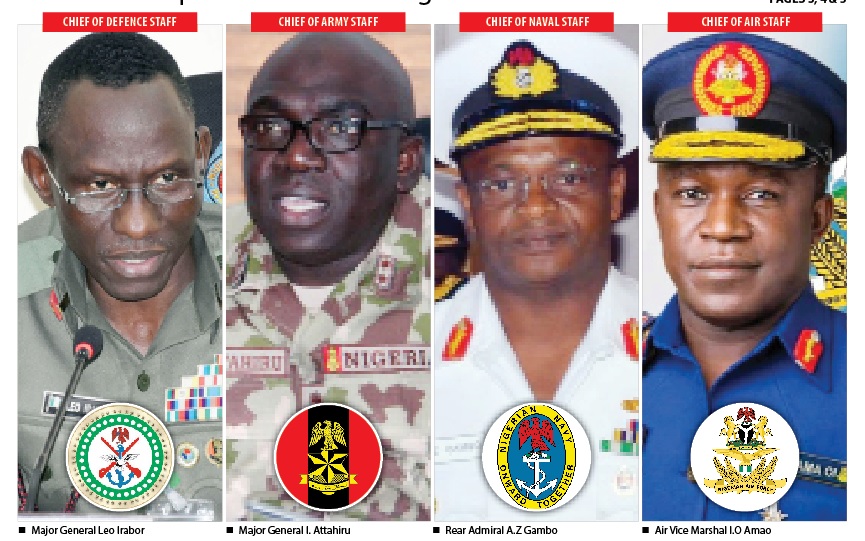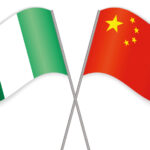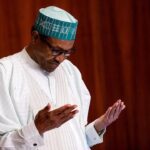“Ten men, ten minds” – Japanese proverb
Four of the country’s most senior military officers were replaced by their subordinates last week, and the nation went into a frenzy over it. This is the second time President Buhari will change service chiefs.
- Attacks on Fulani: Act now before we lose Nigeria, Tofa tells Buhari
- Ethno-religious sentiments affecting governance in Nigeria – Lawan
He had sacked those he met in place when he was elected president back in 2015. The nation barely stirred: it had been on the cards. President Buhari had won an election substantially because voters thought a tough former general will put a prompt end to Boko Haram, a phenomenon that hatched and grew into a major threat under Jonathan’s watch. Those Jonathan had trusted to fight it knew the game was up. They quietly drifted away to await probes while Buhari’s pick set about pushing back the insurgents into forests and islands far away from major towns and cities which they had bombed and attacked at will. Six months down the road, the insurgency and the Nigerian military reached a point that had barely changed since late 2015. The military could not defeat the insurgency. The insurgency survived and even flourished by tying the Nigerian State down, determining the nature of the conflict and winning the war by avoiding total defeat.
A number of observations can be made regarding the state of defence and security under President Buhari’s watch. The first is the survival and mutation of Boko Haram insurgency into a resistant fighting force with branches and strong capacities for adapting and feeding-off the expanding weaknesses of the Nigerian military. It has attracted foreign interests and dug into a territory that allows it to fight and retain capabilities to survive and hurt the military and keep huge populations under control or terrified. For an insurgency whose goal had long been adjusted to survive as an armed embarrassment, this is a resounding victory. Unless there is a dramatic decline in its capacities, or a radical improvement in the capacities of the Nigerian fighting forces, this will be the situation for a long while.
This leads to the second observation. The Nigerian State has fought its war with the insurgency on a single track, fighting an unconventional enemy with a conventional strategy and a mindset that force alone will defeat it. When it failed, it resorted to putting out its own version of the state of the war with an impressive store of language that had nothing to do with the situation on the ground. It was bad enough that the enemy, the communities who suffered under the state of the conflict and all Nigerians knew that the Nigerian leadership merely invents new descriptions of the state of the war. Worse, however, is the fact that the political leadership genuinely thinks it has just about won the war, and everything that happens now is evidence that the enemy is severely damaged and in death throes. This explains why so little had been done to alter the state of the war, including the leadership of the military, six years into gradual decline.
A third observation relates to weak political influence over the military. President Buhari’s trademark tendency to hand over responsibility to people and treat it as the end of his responsibility is boldly stamped in all aspects of the execution of the war. From tolerating damaging turf wars that dissipated the military’s energy, to failure to insist that people he had appointed to exercise responsibility over the military were allowed to do their jobs, to ignoring major setbacks and limitations caused by declining professional standards and morale, to rumoured widespread corruption and failure to effect changes at senior levels which damaged career expectations and requirements of fairness in the service, President Buhari’s management of his commander-in-chief responsibilities have been poor. The military fought its internal battles and fought the insurgency with next-to-no political influence over it. It interpreted the progress of the war to Nigerians, decided rules of engagement, determined friend and enemy and suffered its injuries and setbacks alone. It failed to prioritise vital public support and paid a huge price for the limitations of an administration that appeared to pamper its leadership.
A fourth observation relates to the escalation of additional threats to internal security which the military was deployed to deal with because policing was either woefully inadequate or had virtually collapsed. This spread the military even thinner. Without significant improvements in numbers, capabilities or support, neither the primary nor the secondary jobs of the military were being done well. The Nigerian State failed to explore options to the use of force against every threat, so its only instrument for securing the Nigerian citizen and the nation showed all the signs of stress and decline in effectiveness. The rise in numbers of organised armed criminals worsened the image of the administration and the military suffered further collateral damage. The president would not accept popular opinion that leadership of the military was failing to lead it well, and he could not improve the performance of the military as its commander-in-chief either. Until last week, when he appointed leaders from the top brass of the military to replace their bosses.
The new service chiefs are virtual veterans in a military where they are the only change. It will be unpatriotic and uncharitable not to wish them luck as they step into shoes they may never have thought they could wear. Now they are theirs, but where they go with them is not entirely up to them. The environment in which they will operate will not be radically different, yet Nigerians have a right to expect improvements in the performance of the military. If the fairly used new service chiefs do not make an immediate and real difference in the state of many conflicts into which the military is thrown, they could be Buhari’s excuse that the nation did not know any better when it harassed him into changing service chiefs.
Now the new service chiefs have to bear three burdens: one for being part of an old order that has been found wanting; another for an administration that sends the military to fight and win battles with tied hands; and the third for expectations that they will perform miracles. They can make a difference only if President Buhari is willing to critically scrutinise Nigeria’s security challenges from a perspective that lets him see how desperately exposed the nation is; if he is willing to improve all manner of support and encouragement, including holding leadership of defence and security organisations accountable; and if he accepts to consider options to use of force in the manner the nation deals with threats. As things stand, the military is itself substantially a casualty of incompetence and indifference. It should not be the lot of these service chiefs to superintend further decline of the only institution the nation has that can turn tide against all manner of threats. This is why they need the support and prayers of all Nigerians.

 Join Daily Trust WhatsApp Community For Quick Access To News and Happenings Around You.
Join Daily Trust WhatsApp Community For Quick Access To News and Happenings Around You.


